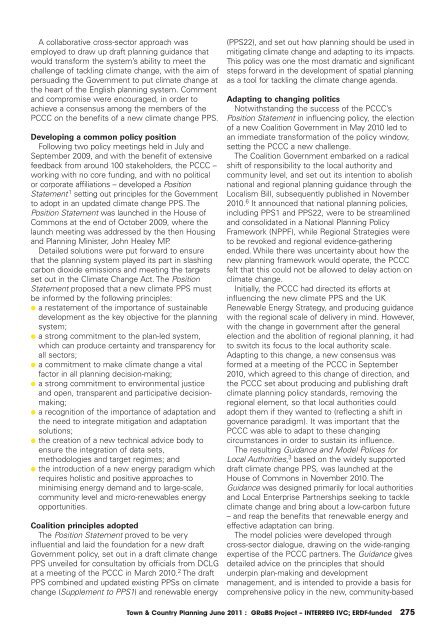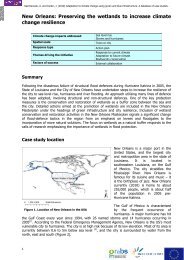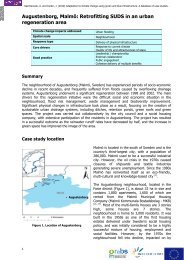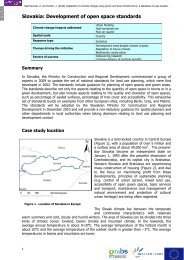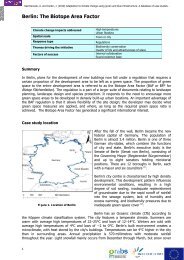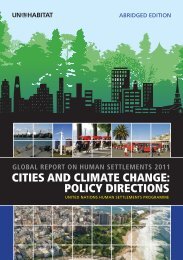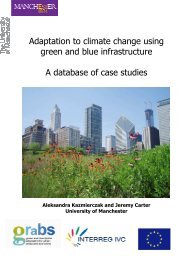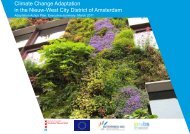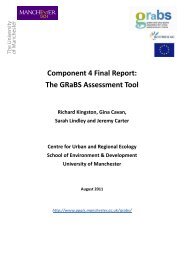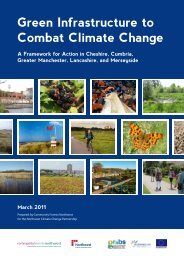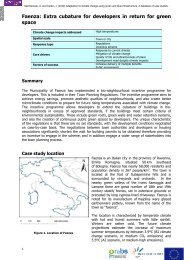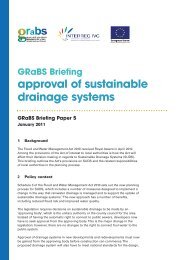Download - GRaBS
Download - GRaBS
Download - GRaBS
You also want an ePaper? Increase the reach of your titles
YUMPU automatically turns print PDFs into web optimized ePapers that Google loves.
A collaborative cross-sector approach was<br />
employed to draw up draft planning guidance that<br />
would transform the system’s ability to meet the<br />
challenge of tackling climate change, with the aim of<br />
persuading the Government to put climate change at<br />
the heart of the English planning system. Comment<br />
and compromise were encouraged, in order to<br />
achieve a consensus among the members of the<br />
PCCC on the benefits of a new climate change PPS.<br />
Developing a common policy position<br />
Following two policy meetings held in July and<br />
September 2009, and with the benefit of extensive<br />
feedback from around 100 stakeholders, the PCCC –<br />
working with no core funding, and with no political<br />
or corporate affiliations – developed a Position<br />
Statement 1 setting out principles for the Government<br />
to adopt in an updated climate change PPS. The<br />
Position Statement was launched in the House of<br />
Commons at the end of October 2009, where the<br />
launch meeting was addressed by the then Housing<br />
and Planning Minister, John Healey MP.<br />
Detailed solutions were put forward to ensure<br />
that the planning system played its part in slashing<br />
carbon dioxide emissions and meeting the targets<br />
set out in the Climate Change Act. The Position<br />
Statement proposed that a new climate PPS must<br />
be informed by the following principles:<br />
● a restatement of the importance of sustainable<br />
development as the key objective for the planning<br />
system;<br />
● a strong commitment to the plan-led system,<br />
which can produce certainty and transparency for<br />
all sectors;<br />
● a commitment to make climate change a vital<br />
factor in all planning decision-making;<br />
● a strong commitment to environmental justice<br />
and open, transparent and participative decisionmaking;<br />
● a recognition of the importance of adaptation and<br />
the need to integrate mitigation and adaptation<br />
solutions;<br />
● the creation of a new technical advice body to<br />
ensure the integration of data sets,<br />
methodologies and target regimes; and<br />
● the introduction of a new energy paradigm which<br />
requires holistic and positive approaches to<br />
minimising energy demand and to large-scale,<br />
community level and micro-renewables energy<br />
opportunities.<br />
Coalition principles adopted<br />
The Position Statement proved to be very<br />
influential and laid the foundation for a new draft<br />
Government policy, set out in a draft climate change<br />
PPS unveiled for consultation by officials from DCLG<br />
at a meeting of the PCCC in March 2010. 2 The draft<br />
PPS combined and updated existing PPSs on climate<br />
change (Supplement to PPS1) and renewable energy<br />
(PPS22), and set out how planning should be used in<br />
mitigating climate change and adapting to its impacts.<br />
This policy was one the most dramatic and significant<br />
steps forward in the development of spatial planning<br />
as a tool for tackling the climate change agenda.<br />
Adapting to changing politics<br />
Notwithstanding the success of the PCCC’s<br />
Position Statement in influencing policy, the election<br />
of a new Coalition Government in May 2010 led to<br />
an immediate transformation of the policy window,<br />
setting the PCCC a new challenge.<br />
The Coalition Government embarked on a radical<br />
shift of responsibility to the local authority and<br />
community level, and set out its intention to abolish<br />
national and regional planning guidance through the<br />
Localism Bill, subsequently published in November<br />
2010. 6 It announced that national planning policies,<br />
including PPS1 and PPS22, were to be streamlined<br />
and consolidated in a National Planning Policy<br />
Framework (NPPF), while Regional Strategies were<br />
to be revoked and regional evidence-gathering<br />
ended. While there was uncertainty about how the<br />
new planning framework would operate, the PCCC<br />
felt that this could not be allowed to delay action on<br />
climate change.<br />
Initially, the PCCC had directed its efforts at<br />
influencing the new climate PPS and the UK<br />
Renewable Energy Strategy, and producing guidance<br />
with the regional scale of delivery in mind. However,<br />
with the change in government after the general<br />
election and the abolition of regional planning, it had<br />
to switch its focus to the local authority scale.<br />
Adapting to this change, a new consensus was<br />
formed at a meeting of the PCCC in September<br />
2010, which agreed to this change of direction, and<br />
the PCCC set about producing and publishing draft<br />
climate planning policy standards, removing the<br />
regional element, so that local authorities could<br />
adopt them if they wanted to (reflecting a shift in<br />
governance paradigm). It was important that the<br />
PCCC was able to adapt to these changing<br />
circumstances in order to sustain its influence.<br />
The resulting Guidance and Model Polices for<br />
Local Authorities, 3 based on the widely supported<br />
draft climate change PPS, was launched at the<br />
House of Commons in November 2010. The<br />
Guidance was designed primarily for local authorities<br />
and Local Enterprise Partnerships seeking to tackle<br />
climate change and bring about a low-carbon future<br />
– and reap the benefits that renewable energy and<br />
effective adaptation can bring.<br />
The model policies were developed through<br />
cross-sector dialogue, drawing on the wide-ranging<br />
expertise of the PCCC partners. The Guidance gives<br />
detailed advice on the principles that should<br />
underpin plan-making and development<br />
management, and is intended to provide a basis for<br />
comprehensive policy in the new, community-based<br />
Town & Country Planning June 2011 : <strong>GRaBS</strong> Project – INTERREG IVC; ERDF-funded 275


